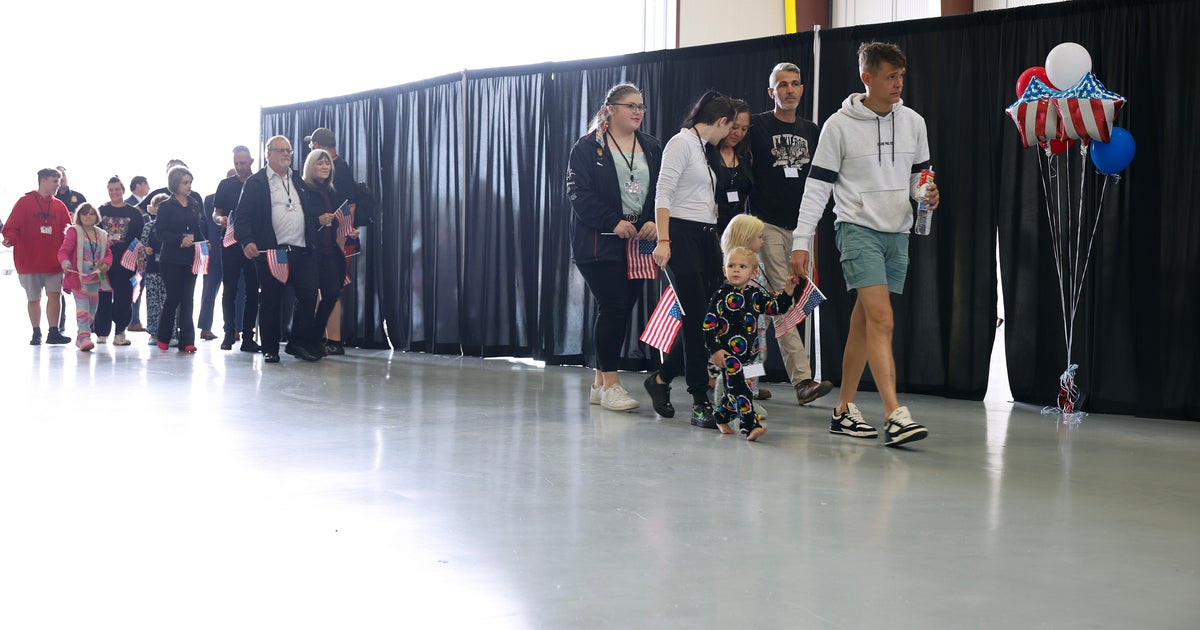
South African President Cyril Ramaphosa will visit the White House next week, his office said Thursday, days after the arrival in the U.S. of the first group of White South Africans, having been granted refugee status under a new Trump administration policy.
Ramaphosa’s office said the visit will provide a “platform to reset the strategic relationship between the two countries.” The statement said Rampahosa, who is the current president of the G20, and President Trump will meet on Wednesday, May 21.
The White House has not yet commented on the meeting.
The visit comes amid renewed tensions between Ramaphosa and the White House as 59 people from South Africa’s Afrikaner community arrived in the U.S. earlier this week. Deputy Secretary of State Christopher Landeau said upon their arrival in Washington that they had faced “egregious discrimination” in South Africa.
State Department spokesperson Tammy Bruce called the Afrikaners a “vulnerable group facing unjust racial discrimination in South Africa.”
Ramaphosa rejected the Trump administration’s characterization of the treatment as “not true,” according to BBC News.
On Tuesday, Ramaphosa called those leaving for the U.S. “cowardly,” saying, “When you run away you are a coward.”
Who are Afrikaners?
Afrikaners are White South Africans of Dutch descent who have lived in South Africa for four centuries. In addition to English, Afrikaners have their own language, Afrikaans, which has its roots in Dutch and is one of the 12 official languages of South Africa.
In 1948, as South Africa was in the process of gaining independence from Britain, the White minority created the system of apartheid, allowing only White South Africans to vote and govern. As well as being denied political power, Black South Africans also faced harsh restrictions on owning land and many were forcibly segregated into settlements.
That ended in 1994, when all South Africans were allowed to vote for the first time, leading to the end of minority White rule. Nelson Mandela’s African National Congress won a majority, and he became the country’s first Black president. The ANC has been in power since 1994, but scandals have harmed the party in recent years and it did not win a majority in the 2024 election, forcing Ramaphosa to form a coalition government.
Thirty years after apartheid ended, White South Africans on average still enjoy a higher standard of living than Black South Africans, with research from the South Africa Human Rights Commission showing just 1% of White South Africans are considered poor, compared to 64% of the Black African population.
Why are Afrikaners claiming refugee status?
In February, Ramaphosa signed a new law that allowed the state to seize land without compensation, in situations classified under the legislation as “just and equitable and in the public interest.”
Although the wording of the law was vague and did not reference White South Africans, many believed it was targeting them since they control most of the country’s land. South Africa’s government has strongly denied any land confiscations or racially motivated discrimination, saying the law targets land not being used or not serving the public interest.
Some have also pointed to attacks on South African farmers in recent years. U.S Deputy Secretary of State Christopher Landau, who met the first group of Afrikaners admitted to the country, recently claimed they faced “egregious and targeted threats.” The South African government, however, has said those attacks were a result of border crime issues and were not racially motivated.
Mr. Trump and adviser Elon Musk, who is a White South African native, have claimed the attacks and potential loss of land amounts to “White genocide.”
In February, Mr. Trump signed an executive order to prioritize the resettlement of Afrikaners under the refugee resettlement program. Access to that program for many other groups was frozen by Mr. Trump on his first day in office, although that executive order allowed for exemptions to be considered on a case-by-case basis.
While Afrikaners make up only about half of South Africa’s White population, Mr. Trump’s executive order granting refugee status only mentions Afrikaners.
According to the U.S. embassy in South Africa, individuals who meet the following requirements can apply for refugee stays:
- Must be of South African nationality; and
- Must be of Afrikaner ethnicity or be a member of a racial minority in South Africa; and
- Must be able to articulate a past experience of persecution or fear of future persecution.
